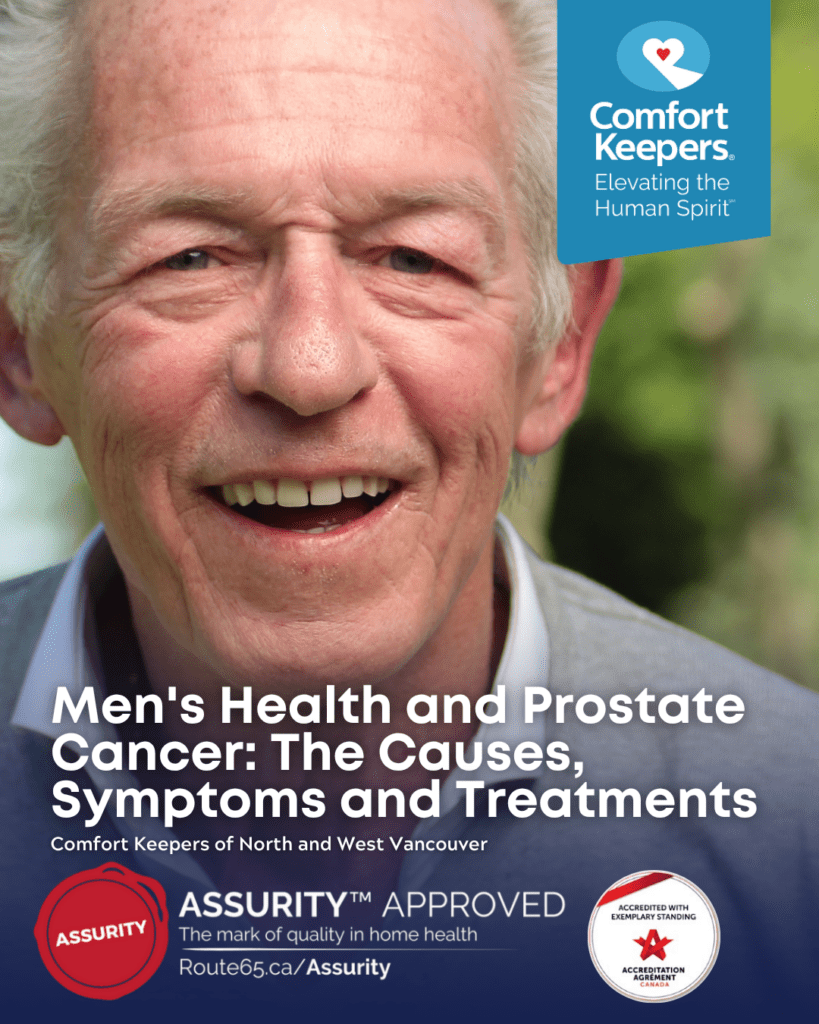Men’s Health and Prostate Cancer: The Causes, Symptoms and Treatments
Senior Health and Wellbeing | June 11, 2025

What Every Family in North and West Vancouver, BC, Needs to Know About Prostate Cancer
The month of June is dedicated to Men’s Health, a vital aspect of every man’s overall well-being. Prostate cancer, the most prevalent cancer among Canadian men, is also the third leading cause of cancer-related deaths, as reported by the Canadian Cancer Society.
Men’s Health and Prostate Cancer: A Growing Concern for Seniors
In 2017, the Canadian Cancer Society projected 21,600 new prostate cancer cases and 4,000 related deaths. This high occurrence, linked to longer lifespans, affects men over 65 by 80%. While the precise cause is still unclear, substantial progress has been made in scientific research regarding the role of genetic factors.
Men’s Health and the Potential Causes and Risk Factors of Prostate Cancer
Researchers note that, in many instances, prostate cancer can be caused by alterations in the normal prostate cell’s DNA. Some changes are inherited genetically, passed on from one generation to the next.
As with many cancers, the genetic factor is not to be underestimated. In fact, a man is twice as likely to have prostate cancer if his brother has/had it. Those that have Lynch syndrome, a hereditary disorder caused by genetic changes, also are at higher risk.
Some of these changes, known as acquired mutations, may occur during the course of one’s life. One potential source for these acquired mutations is diet, as some studies have suggested that vitamin D deficiency may be a predictor of aggressive prostate cancer.
Exposure to certain chemicals may be another source of acquired mutations. A recent study found that U.S. veterans exposed to Agent Orange, a chemical defoliant used during the Vietnam War, had a significantly increased (48% higher) risk of development versus veterans who had not been exposed.
Symptoms of Prostate Cancer in Seniors
The risk of developing prostate cancer increases once men reach the age of 50. However, one of the more challenging aspects of prostate cancer is that symptoms often do not manifest until later stages of development, since it tends to grow slowly.
Common Symptoms of Prostate Cancer:
- Frequent urination (especially urges at night)
- Difficulty urinating
- Bladder control difficulty
- Blood in the urine and/or semen
- Swelling in the legs or pelvis
- Chronic bone pain
- Erectile dysfunction
As some men may have an “out of sight, out of mind” attitude toward medical issues, it is vital that they discuss testing with a physician as close to the age of 50 as possible – especially if they’ve experienced any of the symptoms listed above.
Screening is often done either by testing for prostate-specific antigen levels (PSA) levels in the blood, or by a digital rectal exam (DRE). If the results come back positive, the doctor may wish to test further.
Although screening can help detect prostate cancer, it does not always help gauge the severity or threat level. Additionally, test results may be false-positive (signifying that a man does have cancer when he does not), or false-negatives (signifying that he does have cancer when he does not).
Men’s Health and Cancer Treatment Options
As mentioned, doctors may not have a full understanding of how threatening a man’s prostate cancer may be – which can make it difficult to recommend treatment. Often times, these treatments – done through surgery and/or radiation – can negatively affect various aspects of normal living, especially for older men.
Many health communities tend to agree that screening (and potentially treatment) for older men may not be greatly beneficial since they are more likely to die from other conditions, should they exist.
That is not to say that prostate cancer does not pose a threat. While treatment may potentially be more harmful than the cancer itself, it’s not to be taken lightly. If your aging loved one is concerned about his prostate and unsure about screening, it’s important to begin the discussion with his doctor and to see what the best course of action is, given factors such as age and health. Screening/treatment should always be mutually agreed upon by both your loved one and his doctor.

Comfort Keepers® Can Help with Men’s Health
At Comfort Keepers® North and West Vancouver, our caregivers can help provide a daily routine for your loved one that promotes good health and independent living. We can also make sure that he has transportation to and from any scheduled appointments.
The Best Senior Home Care in North and West Vancouver is Comfort Keepers®
Our senior home care agency offers in-home care focusing on aging in place. Our services include dementia care, end-of-life care, post-surgery care, and palliative care. Comfort Keepers can assist seniors with living transition services, personal care, companionship care, and more!
Quality and Accredited Elderly Care: Happier, Healthier, and at Home with 24/7 Senior Care Opportunities!
Do you need a home care solution for yourself or a loved one? Have you been thinking about retirement homes and their alternatives as a solution? Comfort Keepers® enables seniors to maintain happy, healthy lives in the comfort of their own homes. In-home care services are available in North Vancouver, West Vancouver, and the surrounding areas.
Comfort Keepers® is a Senior Care Agency That Can Make a Difference with Interactive Caregiving™
Our in-home caregivers ensure our senior clients have the best quality of life. The Interactive Caregiving™ program ensures that a senior’s safety, nutrition, mental well-being, and everyday needs are met. This program brings joy and good health to each client’s home.
Comfort Keepers® North Vancouver and West Vancouver Can Help with In-Home Elderly Care Services!
If you are concerned about the health and well-being of a loved one we can help! Comfort Keepers offers 24-hour care and delivers top-quality and compassionate care for seniors. We are dedicated to safety technology solutions that foster independence and enhance well-being.
Locally Owned and Operated Home Health Care Agency
Our care centers around companionship for seniors. Empathetic care originates from the soul and allows us to meet our client’s requirements. The seasoned in-home caregivers employed by Comfort Keepers are carefully chosen based on their empathetic qualities.
Contact the Comfort Keepers® North Vancouver and West Vancouver office at (604) 998-8806 to learn more about our unique in-home care solutions for seniors.
Comfort Keepers is an Accredited Senior Care Agency in North and West Vancouver, BC
Accreditation is a rigorous process that involves industry experts evaluating an organization’s processes, policies, and procedures. Comfort Keepers® North and West Vancouver has been awarded Exemplary Standing by Accreditation Canada. This achievement recognizes that Comfort Keepers® meets or exceeds the stringent quality standards for Home Care companies established by Accreditation Canada.
References:
- National Cancer Institute. “Prostate Cancer Overview.” Web. 2017.
- Cancer Treatment Centers of America. “Prostate Cancer Symptoms.” Web. 2017.
- American Cancer Society. “Early Detection.” Web. 2017.
- Medical News Today. “Prostate Cancer: Symptoms and Causes” by Christian Nordqvist. Web. 2017.
Individualized Home Care Options
Long-Term Home Care, 24 Hour Home Care & Short Term Care Options Customized for You





